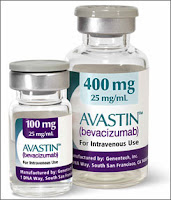Blood test helps target Roche/OSI lung cancer drug

Testing for specific cancer protein markers in lung cancer patients' blood helps find those more likely to respond to Tarceva, a drug sold by Roche and OSI Pharmaceuticals , data showed on Friday.
A study presented at the European Lung Cancer Conference in Geneva showed that a relatively simple blood analysis known as a proteomic test can identify patients whose tumours are likely to shrink with the drug -- one of a class called EGFR-blockers.
"The bottom line is that the proteomic test -- comparing 'good' and 'poor' profiles -- was strongly prognostic," David Carbone from Vanderbilt-Ingram Cancer Center in Nashville, Tennessee, who led the study, said in a statement.
"Proteomics 'good' patients also had a significantly higher response rate than proteomics 'poor' patients."
Tarceva, known generically as erlotinib, is sold by OSI and Roche and is designed to block EGFR, a gene that is overactive in many types of cancer cells.
Other drugs in the same class include AstraZeneca's lung cancer medicine Iressa, and colon cancer drugs Vectibix from Amgen and Erbitux -- sold by Bristol-Myers Squibb , Eli Lilly and Merck KGaA .
Lung cancer is the biggest cancer killer around the world, killing 1.2 million people a year. Only 15 percent of people diagnosed with lung cancer are still alive five years later.
Patients can already be tested to see if they have the right type of genetic profile to respond well to EGFR-blocking drugs, but the methods involve gene sequencing, which is complex and expensive, or a technique called fluorescence in-situ hybridization (FISH), which requires a sample of tumour tissue.
Carbone said FISH was a better predictor of benefit for Tarceva, but noted it can only be done with enough of a tissue sample.
In this study, tumour samples were only available in 22 percent of patients, he said, while 99 percent of patients were able to be successfully assessed with the proteomic test. "This (proteomic) test ... may be of particular value for those in whom tumour tissue is inadequate or unavailable," Carbone said.
read more» Read more...
















